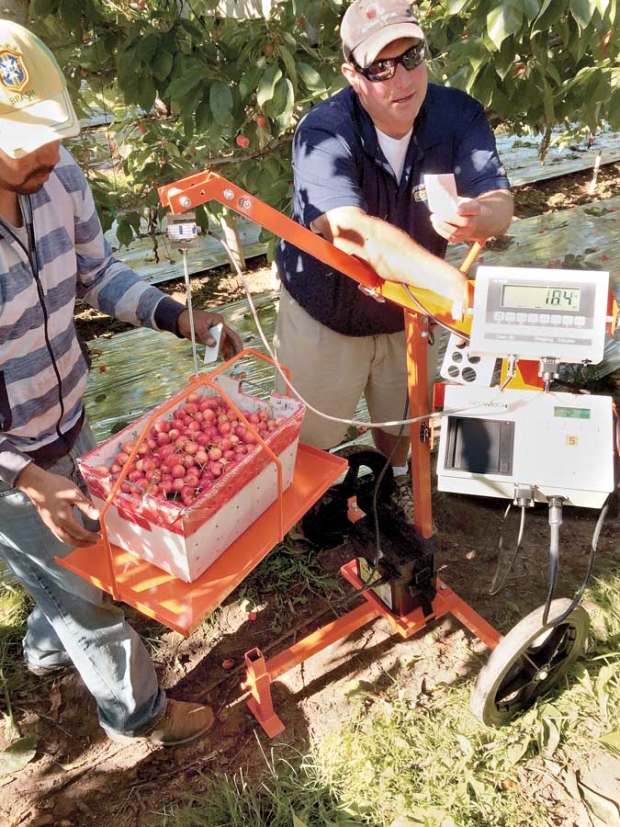
Pickers at an Allan Brothers orchard in the Yakima Valley place their buckets of cherries on the scale so they can be paid for the weight of the fruit. Pickers wear RFID tags that are scanned so they are credited for the cherries they pick. Picking buckets typically have a capacity of 20 pounds but this one registers 18.4 pounds on the scale.
(Courtesy Matt Whiting, WSU)
A system for weighing buckets of cherries in the field, which was developed by Washington State University scientists, is making its debut in commercial orchards.
The FairWeigh system enables growers to pay cherry pickers for the precise amount of fruit they pick. The scientists called it FairWeigh because it’s a fairer system for both pickers and growers than paying per bucket. Buckets typically have a capacity of around 20 pounds but might be under- or overfilled.
Dr. Matt Whiting, horticulturist at WSU, developed the system with Dr. Yiannis Ampatzidis, a former postdoctoral scientist in Prosser, as part of a four-year research project to develop a sustainable, highly efficient production and marketing system for sweet cherries.
“This way, it doesn’t matter how much fruit you have in your buckets, you’re going to get paid for what you pick,” Whiting said. “If you bring in 15 pounds because it’s convenient for you to bring your bucket to the check station now, you get paid for 15 pounds. If you bring in 22 pounds, you’re going to get paid for 22 pounds.”
Similarly, growers don’t have to overpay for buckets that contain less than 20 pounds. And checkers love the system because they can focus on monitoring the quality of the cherries picked, rather than on whether the buckets are being completely filled or not.
Whiting said he and Ampatzidis designed the system as a research tool because they needed to measure and compare the efficiency of pickers in different orchard and harvesting systems.
They conducted the research in orchards of collaborating growers. After the first year, growers and managers started to see potential for using a weighing device in commercial cherry harvesting.
The initial concept was to weigh cherry bins on a large platform-type scale that was pulled around the orchard by a four-wheeler. Pickers wore radio-frequency identification (RFID) tags, which they scanned as they added their bucket of fruit to the bin.
The system was gradually refined, and the latest version involves weighing fruit in the picking buckets before it is dumped into the bin. The bucket-weighing version is much lighter and can be wheeled from one bin to the next by the checker.
It has been designed to be field-rugged, with a liquid-crystal display (LCD) for easy readability outdoors.
Every transaction is saved on an internal secure digital (SD) card. A receipt is immediately printed in the field showing the weight of the fruit, picker identification, date and time, and cumulative weight that the employee has picked that day.
Data are then transferred to the payroll computer and uploaded. A Global Positioning System (GPS) module, which was used on the prototypes, is an option.
Whiting and Ampatzidis (now assistant professor in engineering at California State University in Bakersfield) teamed up with Dr. Mark DeKlein at WSU’s Center for Precision and Automated Agricultural Systems in Prosser to form a partnership called MYM Technologies to commercialize the system. They received a $40,000 grant from WSU’s Office of Commercialization to take the prototype to market.
Automated Ag Systems of Moses Lake makes the frames, Manufacturing Services in the Tri-Cities makes the electronic components, and MYM assembles the parts.
The partners have been testing the system for three years and demonstrating it to growers. It is in use at Allan Brothers Orchards in the Yakima Valley.
Mike Omeg, an orchardist at The Dalles, Oregon, has tested it for two years and found it reduced some of the stresses associated with harvest.
Omeg has 16 picking crews of 10 to 15 people each, and each crew is assigned a quality controller who checks their buckets to make sure they’re full.
“One of the most stressful parts of harvest, as far as the support staff in the orchard are concerned, is getting the picking staff to fill their buckets, because we pay by volume, not by weight,” he said. “It’s a constant battle to get full buckets. You have to be very vigilant.”
Some pickers complain that their crew’s quality controller is more hard nosed than the others, or that the quality controller is showing favoritism toward a friend or relative.
“By paying by weight, it takes all the debate out of the issue of payment,” Omeg said. “It takes away a lot of the conflict. Harvest is already stressful enough.”
He said pickers like to know they will be paid a fair wage for a fair day’s work. They also like to be able to dump partial buckets. For example, it might make sense to empty their buckets while they’re resetting their ladders, even though the bucket is not full.
In addition, because they scan their personal RFID tags, they don’t have to stay with a specific bin checker all day. This allows flexibility in moving picking staff around the orchard.
Having the picking records uploaded directly to the payroll program has also made life much easier for office staff, who otherwise have to manually input data from grungy, cherry-stained tickets each afternoon. It also helps reduce the chance of error when there happens to be two pickers with the same name. Using FairWeigh should reduce his office staff by one full-time person, Omeg figures.
He plans to buy several of the systems for next year’s harvest and hopes that the chassis can be adapted to suit hilly terrain as well as flat ground. •






Leave A Comment